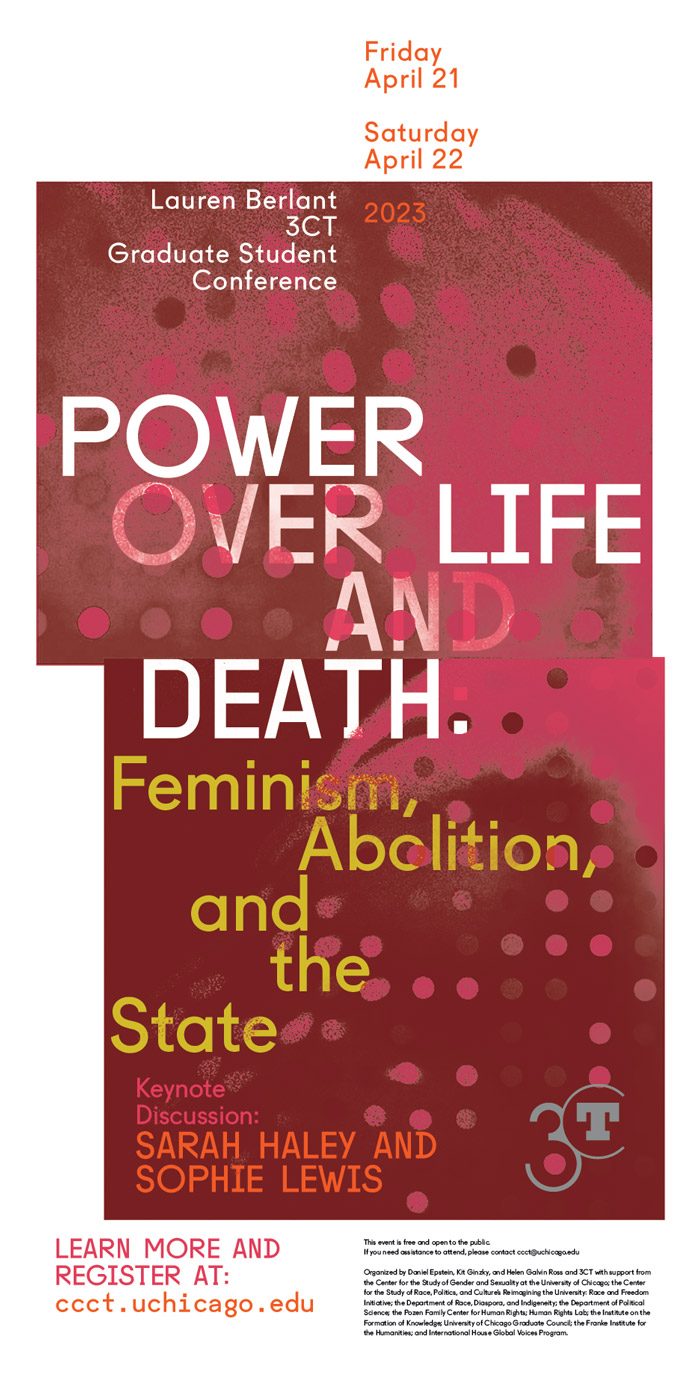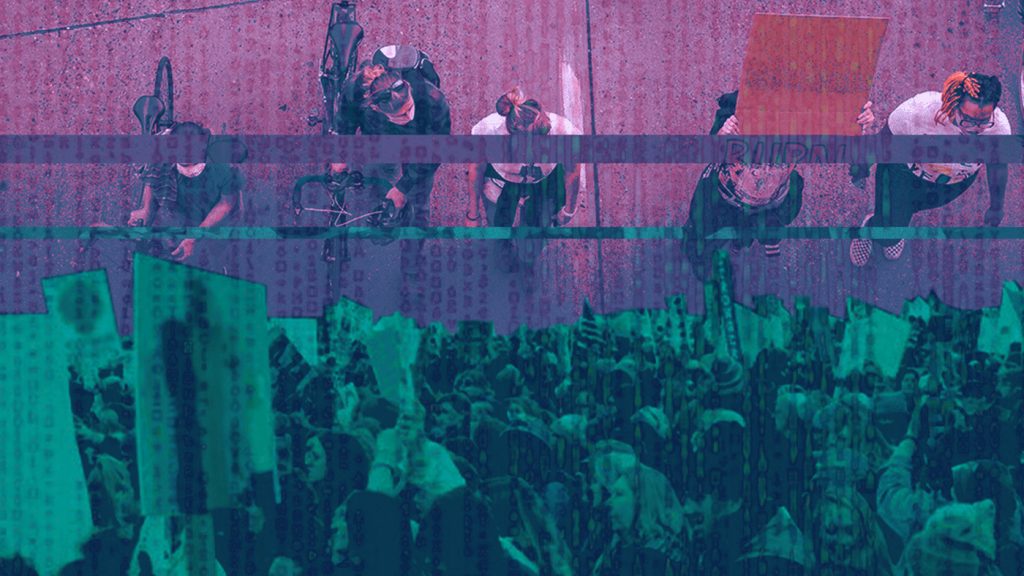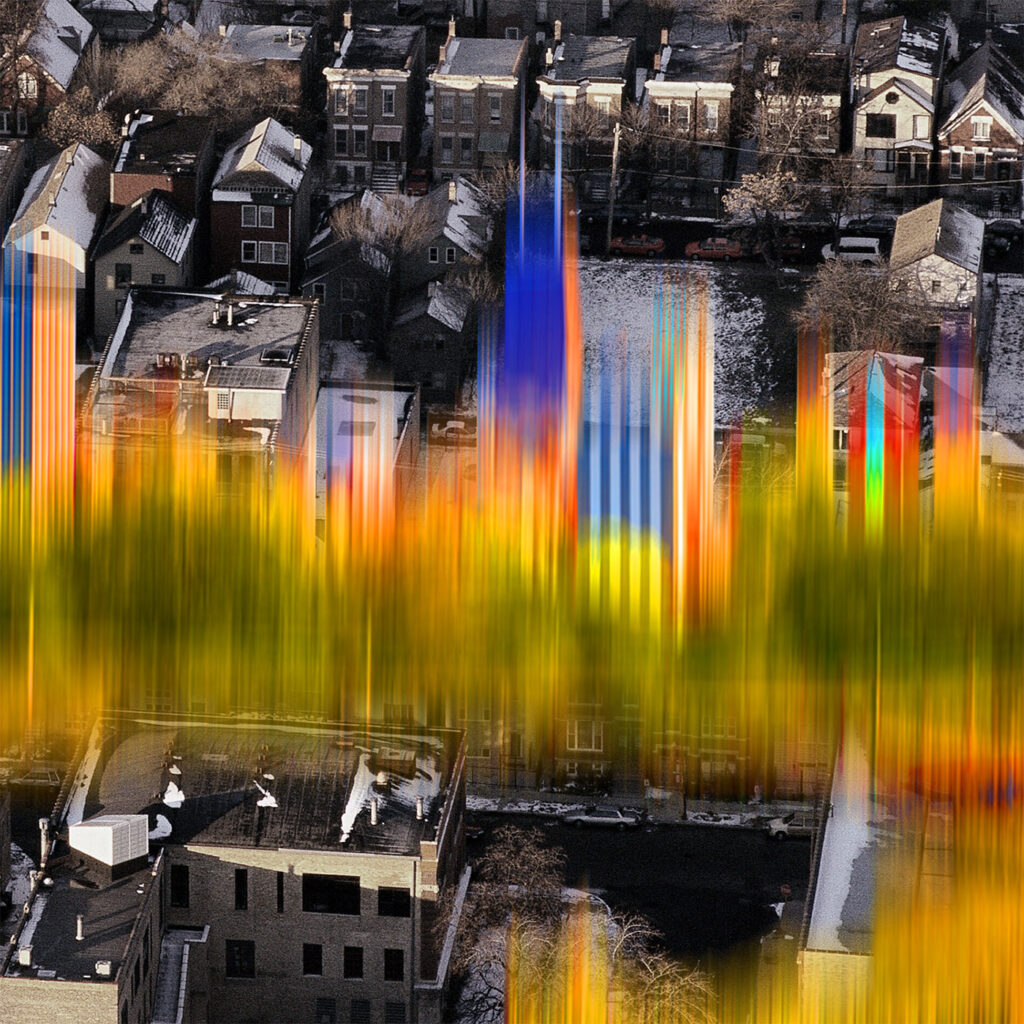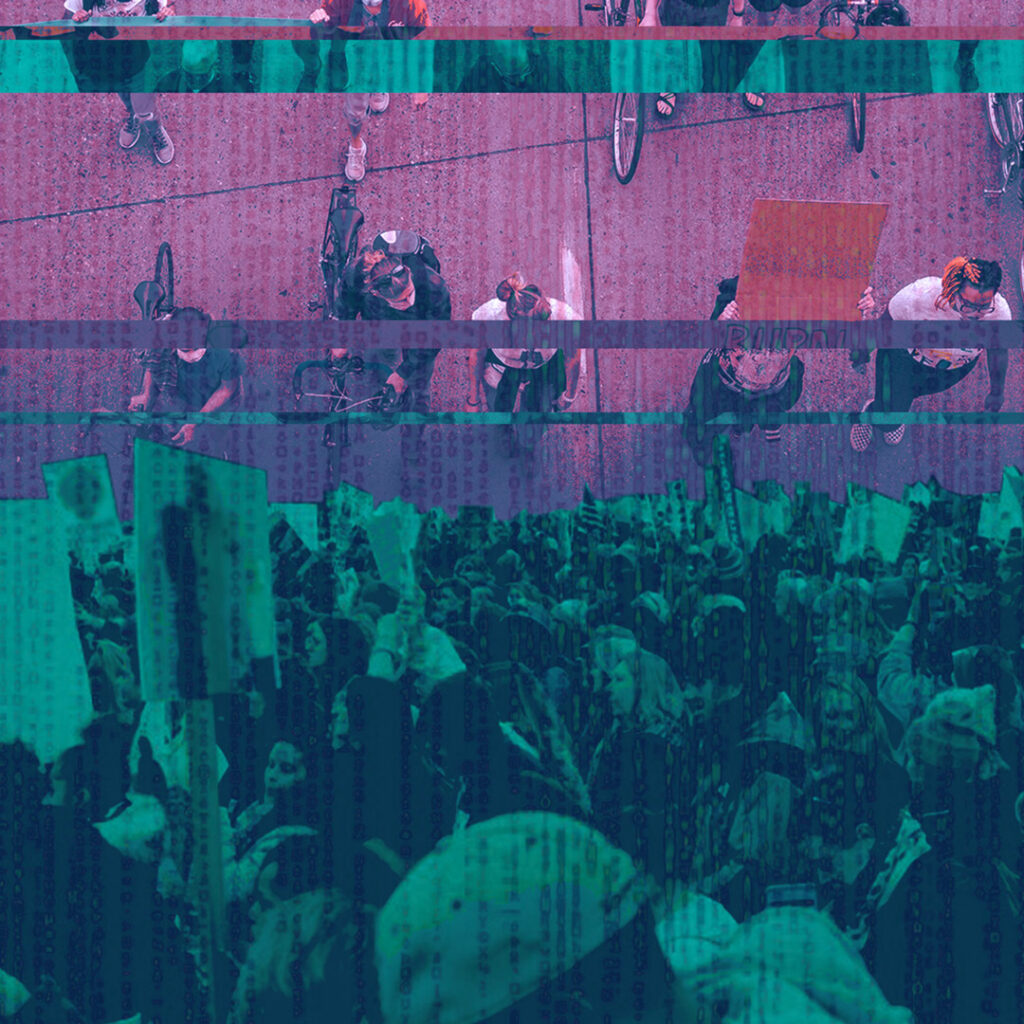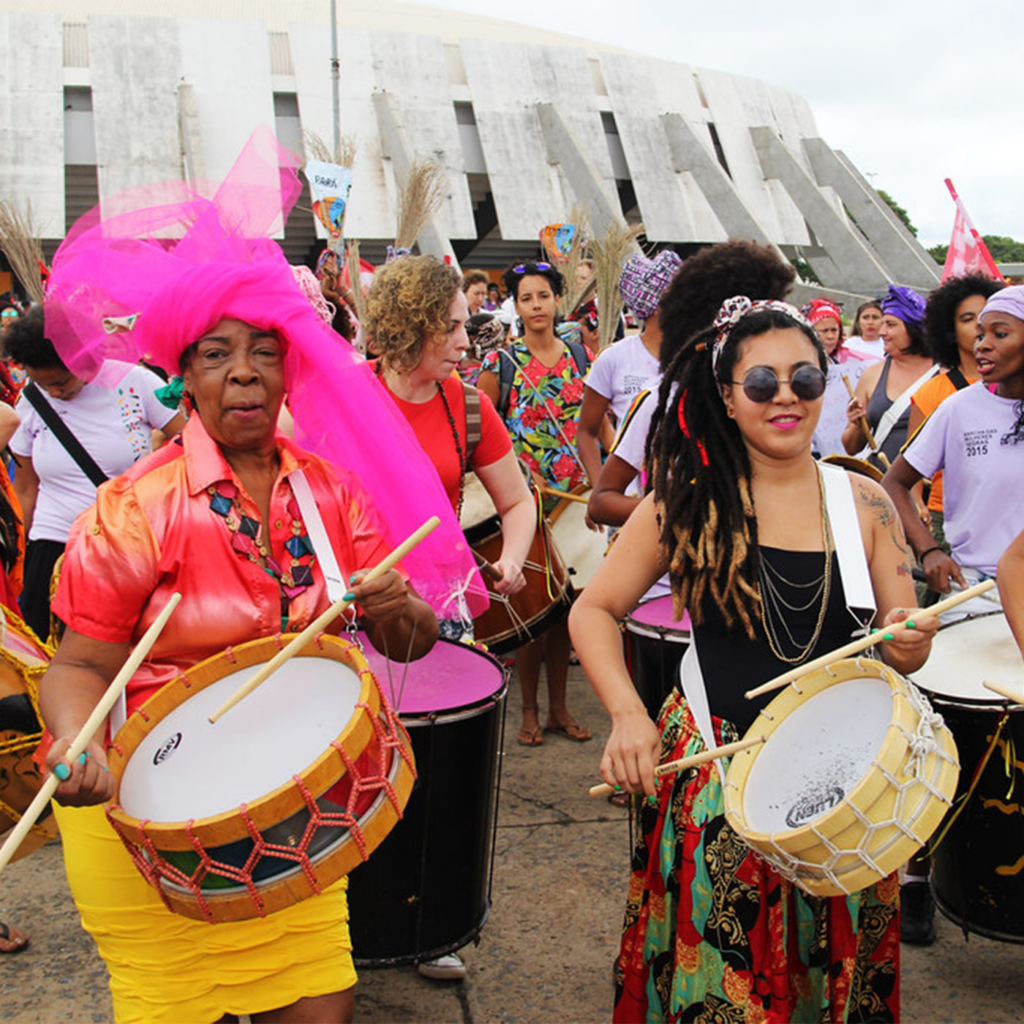Categories
Power over Life and Death: Feminism, Abolition, and the State
Friday, April 21, 2023, 9:30am–5:00pmSaturday, April 22, 2023, 9:30am–6:00pm
Two major events in the last few years have drawn renewed attention to ongoing crises in American life: the Supreme Court decision in Dobbs v. Jackson Women’s Health Organization, giving constitutional validation to patriarchal legal regimes of forced birth, and the murder of George Floyd by four members of the Minneapolis Police Department, dramatically illustrating the routine and often fatal violence that accompanies regimes of racialized policing. We’re interested in theorizing these events as more than just chronologically associated: how might we understand them together as vivid expressions of the state’s multivalent power over life and death? Indeed, these events are cast against the backdrop of the COVID-19 pandemic, in which the state simultaneously abandoned minority and working class populations in the service of private accumulation and naturalized a vision of the home as a particular site of production and reproduction.
Theorizing our present—and the past from which it emerges—therefore requires new attention to the power of the state over life and death and its consequences for feminist and abolitionist critique and struggle. Who lives, who dies? Who is compelled to produce life? Who is abandoned by the state, and who is killed? Who polices these boundaries, and how are they constructed and contested? While Michel Foucault’s conceptual distinction between sovereign force and biopolitical control may be useful, these two forms of state power and resistance to them, frequently seem to travel together. How should abolitionists and feminists think about state power in our post-Dobbs, post-2020 conjuncture? And what can they learn from each other as they meet this moment?
KEYNOTE DISCUSSION: SARAH HALEY AND SOPHIE LEWIS
Saturday, April 22, 3:30pm, International House
Join us for a conversation between Sarah Haley and Sophie Lewis on feminist and abolitionist critique and struggle, followed by a reception.
This event will also feature a display of works from “Gone But Not Forgotten,” a collaborative quilting project by artist Rachel Wallis and grassroots group We Charge Genocide memorializing individuals killed by the Chicago Police Department or while in police custody from 2006 to 2015.
This event is presented in partnership with the International House Global Voices Program.
FRIDAY, APRIL 21, 2023
9:30–10:30am — Breakfast and registration
10:30–11:00am — Welcome remarks
11:00am–12:30pm —Panel 1: Policing Gender
Joanna Cardenas, University of California, Berkeley
“Girlz in the Hood: How Black and Latinx Women Navigate the Streets of South Central Los Angeles”David Helps, University of Michigan
“From ‘Broken Windows’ to Broken Homes: Policing Black Domestic Life in 1980s Los Angeles”Sheila Shankar, University of Chicago
“Between Protection and Punishment: Intimate Partner Violence and the Regulation of Motherhood in the Hybrid Carceral State”Faculty discussant: Eman Abdelhadi, University of Chicago
12:30–1:30pm — Lunch
1:30—3:00pm — Panel 2: Gendering Police
Gabrielle Corona, Princeton University
“Incarcerated Men, White Women, Domestic Labor, and Power at Angola Prison, 1913–1948”Madison House-Tuck, George Washington University
“‘The Louder You Clap, The Harder They Ride’: The Hero Thrill Show, Philadelphia Highway Patrol Drill Team, and the Masculinization of Police Professionalization”Adora Svitak, Yale University
“Heels and Holsters: Police Wives’ Collusive Femininity on Social Media”Faculty discussant: SJ Zhang, University of Chicago
3:00–3:15pm — Break
3:15—4:45pm — Panel 3: The Fetus and the Child
Viola Bao, Northwestern University
“Transnational Adoption and Family Abolition”Molly Henderson, George Washington University
“The Biopolitics of Vulnerability: Tracing Affinities between Environmental and AntiAbortion Activism in the 1970s”Sarah Jeffries, Loyola University Chicago
“‘Merely and Marvelously Our Weapon’: The SisterSerpents’ Legacy of Collectively Produced Radical Feminist Protest Art”Faculty discussant: Linda Zerilli, University of Chicago
4:45pm–5:00pm — Wrap-up
SATURDAY, APRIL 22, 2023
9:30–10:15am — Breakfast
10:15–10:30am — Day two welcome remarks
10:30am–12:00pm — Panel 4: Biopolitics and Resistance in Comparative Perspective
Austin Bryan, Northwestern University
“Biopolitical Subjects, Necropolitical Targets: Organizing Liberation and ‘Getting By’ Under Uganda’s Crises of Criminalization”Anselm Kizza-Besigye and Francis Fabre, University of Chicago
“Sovereignty, Biopolitics, and Crisis in the Global South”Brie McLemore, University of California, Berkeley
“The Right to Choose?: FemTech, Privacy, and the Neoliberal Contradiction”Faculty discussant: Lisa Wedeen, University of Chicago
12:00–1:00pm — Lunch
1:00–2:30pm — Panel 5: Beyond the State
Taylor Fox, University of California, Berkeley
“Abolition Now! Abolition Temporalities, Divine Violence, and the State”Kristine Guillaume, Yale University
“A Passport to Elsewhere: Captivity and Belonging in Dionne Brand’s A Map to the Door of No Return”Emre Keser, University of California, Santa Cruz
“The Man and the State: H(a)unting Monsters”Faculty discussant: Demetra Kasimis, University of Chicago
2:30–3:00pm — Wrap-up
3:00–3:30pm — Break
3:30–5:00pm — Keynote Discussion with Sarah Haley and Sophie Lewis
5:00–6:00pm — Closing Reception
Sarah Haley, Associate Professor of History at Columbia University, has research interests in the history of gender and women, carceral history, Black feminist history and theory, prison abolition, and feminist archival methods. She is the author of No Mercy Here: Gender, Punishment, and the Making of Jim Crow Modernity (University of North Carolina Press, 2016). Prior to arriving at Columbia, she worked as a paralegal and as an organizer with the hospitality workers’ union, UNITE HERE, and was the founding director of the Black Feminism Initiative at UCLA.
Sophie Lewis is the author of Full Surrogacy Now: Feminism Against Family (Verso, 2019) and Abolish the Family: A Manifesto for Care and Liberation (Verso, 2022). As a member of the faculty of Brooklyn Institute for Social Research, Sophie teaches courses on feminist, trans and queer politics and philosophy, including family abolitionism, Shulamith Firestone, and Kathi Weeks. Lewis has helped foster communities of Marxist-feminist cultural criticism with Blind Field Journal, and also collaborated with the Out of the Woods writing collective on the collection Hope Against Hope: Writings on the Ecological Crisis (Common Notions, 2020).
Austin Bryan is a Ph.D. Candidate in Anthropology at Northwestern University, where he is also a National Science Foundation Graduate Research Fellow and Research Assistant at the Buffett Institute for Global Affairs. His dissertation project “Liberation Through Disease” traces the impact HIV/AIDS foreign assistance has had on the politics of Uganda’s social movements for queer liberation. His research has been published in the Journal of Eastern African Studies.
Joanna Cardenas is a PhD student in the African American and African Diaspora Studies department at UC Berkeley. Her current research interest lies at the nexus of critical carceral studies, urban ethnography, and Black feminist thought, with an emphasis on the intersection of race, class, and gender. She is particularly interested in how carceral systems impact Black and Latinx women in inner-city neighborhoods through surveillance and other policing practices.
Francis J. Fabre is an M.A. student in the Social Sciences at the University of Chicago, concentrating on sociology. His current thesis work focuses on transmasculine people´s perceptions of risk, experiences of, and strategies to curtail exposure to police violence in Argentina. More broadly, he is interested in social legitimations of violence and the construction of government legitimacy though the lens of trans* studies. He divides his time between Chicago and Buenos Aires, where he is a member of the Observatory of Security (ObSe) and the Program for the Study of Social Control (PECOS) at the University of Buenos Aires.
Taylor Fox is a JD/PhD student in Jurisprudence and Social Policy at UC Berkeley. Taylor’s research interests include law and violence, policing and U.S. empire, the political economy of criminalization, and 20th century political and social theory.
Kristine Guillaume (she/her) is a PhD student in English and African American Studies at Yale University. Her research interests include 20th and 21st century African American literature, prison writing, and Black political thought.
David Helps is a PhD candidate in History at the University of Michigan. His dissertation, “Securing the World City: Policing, Migration, and the Struggle for Global Los Angeles” explores the relationship between crime politics and the city’s transformation as a “world city” between the early 1970s and the aftermath of the 1992 uprisings. His work has appeared in The Nation, Foreign Policy, and the Journal of Urban History, among other places.
Molly Henderson (she/her) is a fourth year PhD student in American Studies at George Washington University, and holds a B.A. in American Studies and Urban Studies from Northwestern University. Her primary fields are cultural studies, feminist and queer theory, political theory, and the environmental humanities, with a focus on reproduction, the family, neoliberalism, and social conservatism. Her dissertation focuses on the intersection of the politics of the family and environmentalism in the 1970s-1990s, and in particular on the ways discourses of children and reproduction are invoked as signs of vulnerability and futurity across the political spectrum.
Maddie House-Tuck (she/her) is a PhD student in American Studies at George Washington University. Her research considers cultural tactics of police professionalization, and the role live performance has played in crafting legitimating myths that underwrite policing. Prior to attending George Washington University, Maddie received a Masters in Theatre and Performance Studies from Washington University in St. Louis.
Sarah Jeffries is a second-year student in Loyola University Chicago’s Women’s and Gender Studies MA program studying postwar era American literature through the lens of queer and feminist theory. Other research interests include popular literature, the Gothic, and lesbian pulp fiction. Her current thesis research focuses on use of allegory, satire, and the feminist Gothic in Ira Levin’s novels The Stepford Wives and Rosemary’s Baby and their original film adaptations.
Emre Keser is a PhD student in History of Consciousness with designated emphases in Politics and Literature at the University of California, Santa Cruz. His research interests lie at the intersection of critical theory, social and political thought, postcolonial studies, gender and sexuality studies, and Middle East studies. He is trying to develop a project on the prevalent analogy in modern Western political thought between the state and the human, interrogating the ways in which they have been modeled after one another through figures of monsters against which they define themselves and through practices of dehumanizing/monsterizing.
Brie McLemore is a Ph.D. candidate in the Jurisprudence and Social Policy program with a designated emphasis in Science and Technology Studies at the University of California, Berkeley. Her research explores how technology and the rise of big data exacerbate gendered and racialized surveillance, both at the hands of the State and by corporations. Prior to attending Berkeley, Brie received a Master of Public Policy and Master of Arts in Women’s, Gender, and Sexuality Studies from Brandeis University and a Bachelor of Arts in Anthropology and Gender Studies from New College of Florida.
Sheila Shankar (she/her) is a social work PhD student at the University of Chicago. Her work focuses on gender-based violence, transformative justice, and healing. Her research explores practices of safety, parenting, and care amongst mothers who have experienced intimate partner violence and are involved in the carceral system. Sheila has been involved with movements to end gender-based violence in queer and immigrant communities for 10 years. Currently she works as a therapist using intersectional feminist, decolonial, and somatic approaches to promote healing justice.
Adora Svitak is a PhD student in the joint program in Sociology and Women’s, Gender, and Sexuality Studies at Yale University. She is interested in researching gender, power, space, and relationships, presently focusing on heterosexual intimate life. Prior to Yale, she was working in communications for the non-profit that operates Wikipedia. She received her B.A. from UC Berkeley, majoring in Development Studies and minoring in South Asian Studies and Creative Writing. She considers contemporary literature both a source of joy and an integral form of sociological data.
Organized by Daniel Epstein, Kit Ginzky, and Helen Galvin Ross and 3CT with support from the Center for the Study of Gender and Sexuality; the Center for the Study of Race, Politics, and Culture’s Reimagining the University: Race and Freedom Initiative; the Department of Race, Diaspora, and Indigeneity; the Department of Political Science; the Pozen Family Center for Human Rights; Human Rights Lab; the Institute on the Formation of Knowledge; University of Chicago Graduate Council; the Franke Institute for the Humanities; and International House Global Voices Program.
This event is free and open to the public, and registration is recommended. Please email us at ccct@uchicago.edu if you require any accommodations to enable your full participation.
